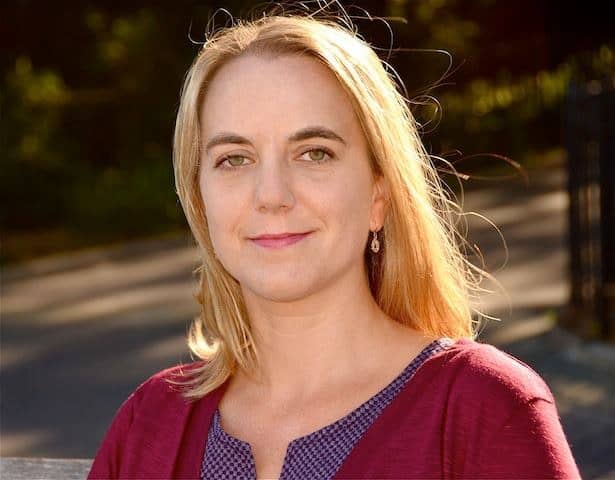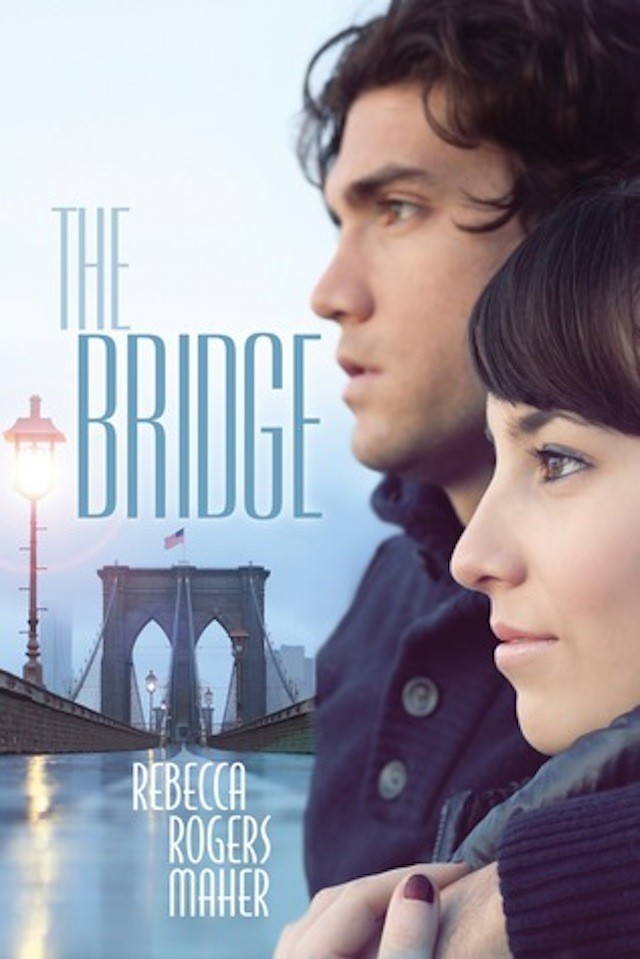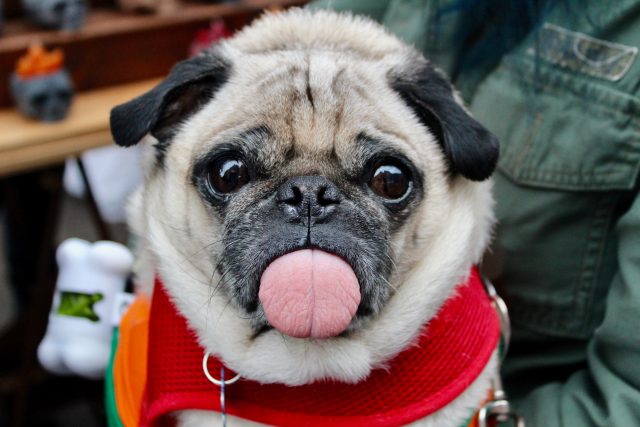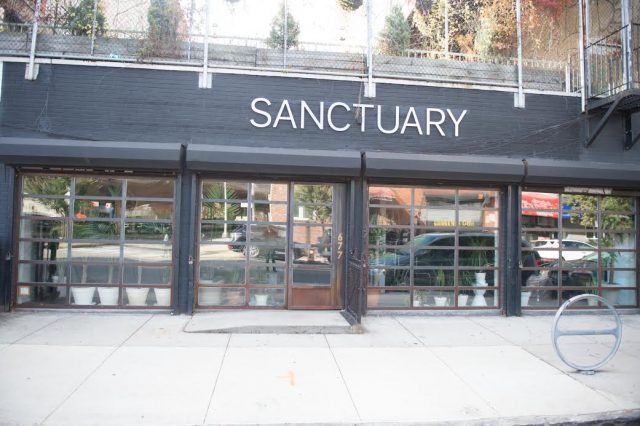
Dear reader, does your summer book list include any libidinous lit? It might after your intro to Rebecca Rogers Maher, a romance writer whose stimulating fiction for women brings heart to the genre’s heat.
Over the past few years, writing short erotic novels has bloomed into a fun side gig for Maher, 41, who skips a nom de plume in favor of representing her work herself: as a mom, educator and Brooklynite of 17 years. Eight well-received ebooks in, Maher’s sizzling sentences prove more than sweet nothings—in fact, she tends to pen unconventional lovers who are working-class, complicated, and have realistic backstories. Her most recent, Just Give Me a Reason (which came out in February), presents its heroine as a pregnant woman who must confront her flirty feelings about a hunky single dad. (While her stories mainly address hetero trysts, Maher says same-sex romance is due in future books.)
As a self-identified feminist writer, Maher sees sexuality as integral to a character’s development, not just fodder for hot n’ heavy hangouts (though that’s fun too). Brokelyn joined Maher at a Cobble Hill café to talk the writing life, Brooklyn as a backdrop, and the racy genre’s surprising contribution to the self-publishing movement.

What was your entry into romance writing?
I still am looking for the short answer to that question. As a kid I grew up reading romance novels that my mother had lying around, so it was a genre that I knew pretty intimately. I came to writing kind of late compared to other people—I was in my 30s already and my kids were little. I was freelancing a bit—I teach, but I was with [my kids] a lot, and I needed some time by myself. I decided to write something, it turned into a romance, and then I just kept writing romance from that point. It’s a really juicy, fun kind of genre to work in.
How naturally did your writer’s voice come at first?
One of the things I’ve struggled with, frankly, is that I’m not a great fit for this genre, because I think a lot of people do come to [romance]—and they have every right to—for the fantasy. So I think there’s more of a commercial draw to characters that are much less specific and much more archetypal. Particularly for the heroine, interestingly—I mean I’m speaking very broadly here, and that’s not entirely fair, because there are lots of wonderful people doing incredibly interesting work in romance—but very generally speaking, I think the heroes tend to be a lot more rich and interesting because [female] readers are coming wanting to be with that hero, but they’re [also] wanting to be the heroine. So the more specific the heroine is, the less likely you are able to sink in, be in her place, and pretend to be her. My heroines, I think, are very specific to themselves, because that’s what’s interesting to me to write about.
Many erotica authors write anonymously, under a pen name. What does publishing under your real name mean to you?
You know, I don’t know if that was the right thing to do in the end, but that’s what I did. I felt like I wanted to be able to stand behind what I was writing—to have that as my identity and not have a separate identity. But I am a teacher, so it could potentially be complicated down the road. So far it’s been fine. There’s not a lot of crossover between those two worlds, but it’s my name and my likeness.
For me personally, I find that very powerful — to stand behind the characters you’ve crafted. The writing is, of course, juicy and gives you what you want out of a romance, but also gives you a satisfying literary experience.
Thank you. I didn’t want it to be something that I felt I needed to hide. I feel proud of this work, it’s very interesting to me, I feel passionate about it, and I definitely want my selves to be integrated, you know? Also, there’s a bit of a stigma—I wouldn’t call my work “erotica” though it is very explicit. There is a bit of a stigma to sex writing and I feel like that’s bullshit. It’s an aspect of life that all of us experience and that we should be able to speak about and write about freely.
I actually really like to read erotica. I just don’t think that my books are erotica, because I don’t want erotica readers to come to my books and be disappointed. But I think it’s a great place to be writing and reading.
Do you consider yourself a feminist writer?
I am a feminist writer, yes, and I strive to be an intersectional feminist. I think the most interesting work in the romance genre takes on social forces—not necessarily overtly, but woven realistically into the fabric of the world the characters inhabit. I hope to become increasingly ambitious and complex in what I take on as a writer, and what’s exciting is that this is happening throughout the genre as it shifts and grows.
Tell me about your relationship with your publishers and with Amazon, where your ebooks can be purchased. How does that arrangement work?
I’ve had three different publishing experiences. I started with a digital imprint of Harlequin [a publisher of books for women] called Carina Press. They publish digitally, exclusively, and so they’ll distribute to all of the online places like Amazon and Barnes and Noble. I did three books with them and then I self-published three, which is incredibly easy to do. I think a lot of interesting shifts have happened in the genre as the result of people being able to self-publish, being able to push the boundary of what is acceptable in the genre and what the rules are, because you can do whatever you want. No one can tell you no.
So self-publishing has become a democratizing factor in romance writing?
Right. And I mean, of course there have been a lot of terrible books published that way, but there have been some really interesting ones too. My last two [books] were with Random House—off the strength of the self-published books, actually, they contacted me and asked me for books. And that’s been great. Up until now I’ve had all digital books. . . . People consume romance very rapidly. There’s a kind of insatiable demand. I think romance probably has created more of a market for ebooks than any other genre because it’s fulfilling a need [for quick consumption].
And the affordability of these quick reads certainly helps feed that appetite.
Right.
I was wondering how pricing of romance ebooks works, because it seems like you write pretty prolifically at very low cost to consumers, with stories ranging from 99 cents to $3.99. Is pricing a negotiation with your publisher?
No, romance [writing] is full of very concrete standards across the board, and pricing is one of those. It’s interesting that you say prolific, because compared to almost everyone else in the romance genre, I write very slowly. It’s really now accepted that you will release, at minimum, two books a year, and many authors will release three or four a year. You just keep writing and releasing and writing and releasing. So I have a pretty short practice compared to some of my contemporaries.
I know you’re busy with your teaching career and having a family, so what does a successful writing day look like to you?
It’s a lot of preamble. I really believe in just sitting still for a while and seeing what comes out. And the great thing about romance is that it’s very dream-like. If it’s a fairy tale, whatever the conflict is, it gets resolved in the the end. I don’t always know when I’m beginning to write about a conflict how it’s going to resolve. And when I see how that happens it’s usually very illuminating … I learn something from it. In order to get the most out of that experience, I have to kind of create space in my brain to work with. Sometimes that means I’m literally lying down in my bed for two hours staring at the ceiling before I start writing — just thinking about it, letting my thoughts wander, and figuring out what the knot is and how I might untie it. Then I’ll start writing. So a successful writing day is actually a short period of time with intense typing and a lot of time sitting around.
Has Brooklyn inspired any settings for your books?
Yes, actually. A couple of my books are set here—it’s the two most difficult ones, in a way. Fault Lines is a book about a rape survivor and that takes place right in this neighborhood. And The Bridge begins with the hero and heroine on the tower of the Brooklyn Bridge about to jump off and kill themselves. They stop each other and spend a day in New York City. That’s a very very New York book. New York is a character in that book. [laughs]
What’s your advice for aspiring romance writers?
It’s not really advice, but I’d say just go ahead and write. Just go ahead and write it and finish it, then start the next one. The good thing about the drive in the romance genre is that you can’t be too precious about each manuscript. You just have to finish it and get it out there. That’s how you find your voice. You don’t find it by theorizing about it or wondering about it. You find it by writing. And it may take a couple of books before you really realize who you are and what you’re doing, but if you want to realize who you are and what you’re doing, you need to write those couple of books. Not even the first one — the first couple of them.
What do you think about self-publishing for writers who are just starting out?
You know, there are costs and benefits to either path. I like actually having a mix of self-publishing and traditional—even my “traditional” publishing experiences, though, are non-traditional because they were ebooks, so the same rules don’t apply. The downside of self-publishing is that it really is a lot of work, and it’s a lot of understanding marketing strategies that don’t necessarily correlate with being a creative person … so you have to have both skillsets. Not all writers have them or should have them. I think it depends whether you want to take that on or not. You aren’t just selling your book, you’re selling that persona, that brand. It’s not always comfortable. It’s never comfortable.
Do romance writers ever sell merch?
They do, I don’t. Again, I think the people who are most successful in this business do have that head for business … they have merchandise, they have newsletters, they have street teams—they have this whole machinery around selling their persona, and I don’t.
I know it’s probably not a palatable idea to you, but if you had to sell one iconic piece of merch to your fans, what do you think that would be?
That’s such a cool question … okay let me think … I don’t know — help me!
Hmm, I don’t know, maybe something Brooklyn-related: a mason jar with your initials on it? I guess that’s not too sexy, though.
I was thinking something coffee-related. This is all 100 percent powered by coffee. [laughs]
One last question: what’s a romantic Brooklyn date spot you’d recommend?
Walking over the Brooklyn Bridge is, I think, the best. It’s tried and true. People talk more when they’re walking.
Look out for Rebecca’s forthcoming book, Flare, due out this year and follow her on Twitter at @RebeccaRMaher. If you fancy, Sarah’s on there too.
Leave a Reply



